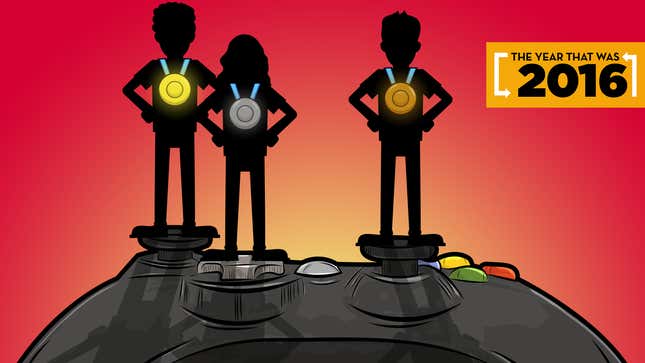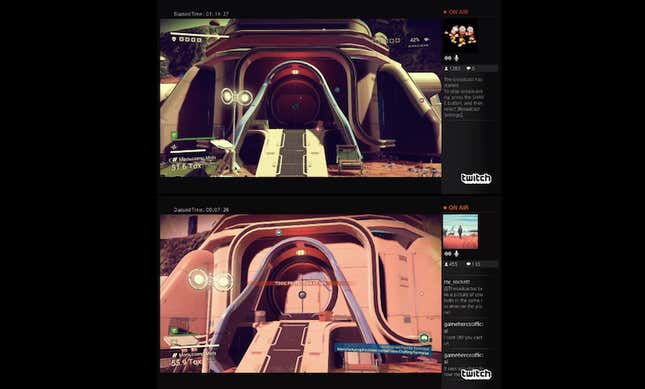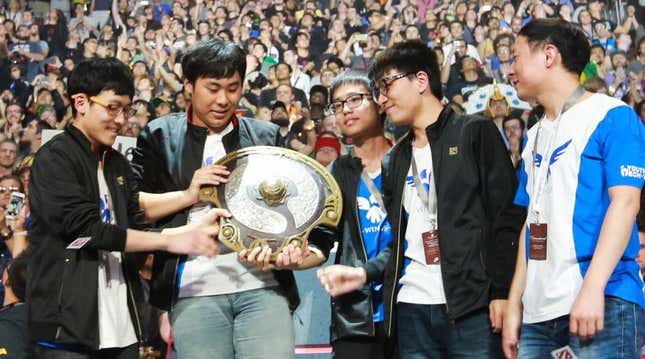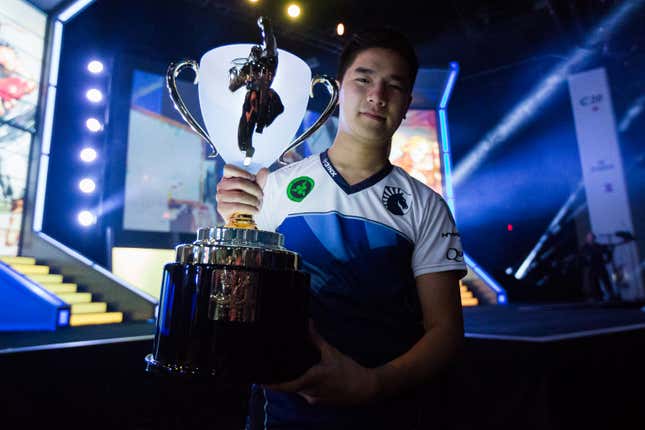
The people who play video games have an impact on what we play and the gaming culture at large. Since 2012, that premise has informed our annual listing of the Gamers of the Year.
This piece originally appeared December 22, 2016.
There’s no one achievement that can put someone on the list. Some are champions of competitive gaming. Others are players who dig deeper into what they’re playing and resurface with findings that benefit the gaming community. We’ve highlighted hackers and critics and gamers-turned-executives. Over the years, some of our picks have impacted games in ways we all love. Others are controversial but nevertheless made their mark.
Here are our selections for 2016:

TheGalacticCactus And Psytokat, The Players Who Tried To Meet In No Man’s Sky
The confidence in the title of user TheGalacticCactus’s August 9 post to the No Man’s Sky subreddit is heartbreaking in retrospect. “I’m About to Meet Another Player! (Seriously),” he wrote, with the confidence of, say, a New York Times pollster predicting a win for Hillary Clinton. It wasn’t meant to be. The players didn’t meet, and their failure to do so provoked one of the most dramatic deflations of a much-hyped game in the medium’s history.
Hopes had run high for No Man’s Sky. The game’s 2014 debut trailer was dazzling, and its lead creator, Sean Murray, promised so much. Players would explore a procedurally generated universe so vast that the efforts to convey its scale in drooling previews became a joke. They’d discover beautiful, exotic worlds. The game held such marvelous promise that Murray got to preview his game on Stephen Colbert’s late night show, and when Colbert asked if players could run into each other, Murray said: “Yes, but the chances of that are incredibly rare just because of the size of what we’re building.”
On No Man’s Sky’s launch day, the heretofore little-known TheGalacticCactus reported to the subreddit that he’d found a star system discovered by another player named Pystokat. He was shocked. A sign of life of another player! They messaged each other. “We are currently 4 systems away!” he wrote. “We will meet at a space station.” And then: “Edit: My twitter is TheGalacticCact I’m shaking…” And then: “Edit: We are both in the same station but cannot see each other…” The two players livestreamed their attempt and the gaming world watched. They couldn’t meet. They were standing in the same spot of what they assumed was a shared video game world. And nothing. A day later, with legions of gamers wondering if the game had glitched or if it didn’t really support player met-ups Murray tweeted with dissatisfying vagueness: “Two players finding each other on a stream in the first day - that has blown my mind.”
It all fell apart from there. TheGalacticCactus and Psytokat hadn’t met because the game wasn’t programmed for them to be able to meet. Players fumed that No Man’s Sky didn’t work as it had been teased and promised. Murray and Hello Games retreated from irate players. And so developed a cautionary tale for game makers, the press and fans about what to promise, what to publish and what to hope for, all thanks to two guys just trying to play some co-op.

Wings Gaming, Dota 2’s Unpredictable Champions
“I’ve failed over and over and over again in my life,” Michael Jordan said in a Nike commercial, “and that is why I succeed.” Despite the number of outstanding teams across different games, none has risked more to accomplish so much in so little time as Dota 2’s Wings Gaming. Ever since the team reformed last year, Wings has clawed their way from wild card hopefuls to the pinnacle of the game.
The Chinese squad, consisting of Chu ‘shadow’ Zeyu, Zhou ‘bLink’ Yang, Zhang ‘Faith_bian’ Ruida, Zhang ‘y`Innocence’ Yiping, and Li ‘iceice’ Peng, not only won this year’s International, netting the team $9.1 million of the largest prize pool in esports history, they did so with style, daring, and grace. Far from unraveling the team, their inconsistent performances at the beginning of the year gave way to a level of team trust and willingness to experiment that has made Wings one of the best Dota 2 teams ever.
Pummeling previous champions Evil Geniuses during the semifinals, Wings went on to stomp Digital Chaos in the grand finals 3-1, selecting 17 different heroes across four matches in a series of unprecedented drafts that led one analyst to declare Dota 2’s meta dead. The team’s carry, Shadow, proved irresistible time and again, going 20/0/16 as Faceless Void in Game 3 of the grand finals and closing out the tournament as its MVP.
—Ethan Gach

NuckleDu, Bringing Balance Back to Street Fighter
Lee “Infiltration” Seon-woo, who was this year’s Evo champion, and one of the best Street Fighter players in the world, is 31. In an industry that seems to soak up youth and spit it out only a few years later, the fighting game community stands out for the prowess of its veteran talent. And yet somehow despite his fledgling status at the green age of 20, Du “NuckleDu” Dang became the first American to win the Capcom Cup championship—and the youngest. Street Fighter has always occupied a unique place in American pop culture, and seeing such a gutsy player grow into the game and make it his own felt like symbolic vindication of having spent all those days dueling sonic booms with strangers in arcades.
NuckleDu first started turning heads when he placed 13th at the Street Fighter 25th Anniversary Tournament, but spent most of the next couple years going under the radar until winning Apex 2015 and making the top 8 at that year’s Evo. With Street Fighter V, NuckleDu took things to another level, growing beyond the offensive-minded, taunt-ready Guile he’d originally made waves with to a complimentary combo that added the frenzied, body-slamming wrestler R.Mika to his arsenal. The duo allowed him not only to hop-scotch legends from the other side of the Pacific, but also best American rival Ricki Ortiz. A strong year that grew into winning both the North American Regional Finals and Canada Cup earlier in the season crescendo with a Capcom Cup performance in which NuckleDu never dropped two consecutive games in a set.
—Ethan Gach

Dronpes and Moots7, Silph Road Founders Who Helped Demystify The Year’s Hottest Game
No one was expecting development studio Niantic’s Pokémon Go to blow up the way it did this past summer. More than 100 million people were suddenly roaming the globe, phones held out in front of them, searching for Pokémon hiding in their midst. The game only offered vague hints about where the monsters might be, and its limited tracking system was glitched pretty much from the start.
Enter the likes of Dronpes and Moots7, two guys who decided to marshall a globe of Pokémon Go players to figure the game out. They originally planned to make a site that would facilitate monster-trading, but the lack of an option in the game to to do that forced their creation, The Silph Road, to instead become the foremost resource for information about the monsters featured in the game. The two Silph Road “executives” recruited an army of “travelers” to submit sightings and fill out a map that would eventually display nests of reliable Pokémon spawn locations. With the apparent help of info gleaned from hacks of the game and lots of crowd-sourced know-how, the Silph Road team also assembled the definitive breakdown of the strengths and weaknesses of each monster in the game.
As with Destiny in 2014 and 2015, the story of Pokémon Go was very much the story of game creators wrestling with game players. Other fan-driven efforts to help demystify the game, including the popular mapping service Pokevision, would eventually get blocked by Niantic. The game was remarkable, though, in how impactful each of its players could be, as enthusiasts could stake a claim to their neighborhoods or even the most famous landmarks in the world.
With millions of people playing games and the means to make your mark more abundant than ever, we could have named so many others as gamers of the year. Here are some runners-up, all of whom made an impact—like it or not—on gaming:
- Darbian, the Super Mario Bros. speedrunning champ who traded the record with Kosmic all year
- Fipps, a commenter on Blizzard’s message boards whose complaint about the pose of an Overwatch hero caused a change in the game while igniting new debate about sexualization of game characters and the responsiveness of game developers as well as fueling countless Tracer butt memes
- Caliente, maker of extraordinarily popular nudity mods for Bethesda games
- The Game Detectives, who labored to crack Overwatch’s Sombra, Sigil and maybe even the Frog Fractions 2 ARGs
- Zoie Bergher, the so-called “bikini streamer” who was banned from Twitch but found huge success and notoriety on YouTube before running afoul of that platform, too.
- HonorTheCall, the YouTuber who broke the CS:GO Lotto scandal
- “Grandma Shirley” Curry, the octogenarian Skyrim player whose videos about the game on YouTube have delighted thousands of fans.
And so many more. Add your picks for Gamers of the Year—players who had a big, interesting and/or important impact, positive or negative, on gaming—in the comments below.